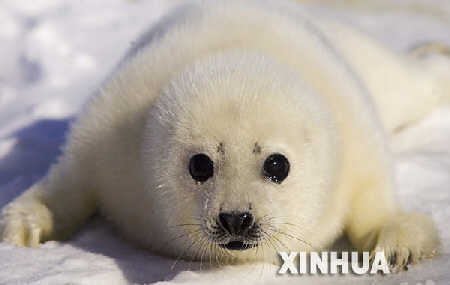Canada's annual seal hunt started Monday, under pressure from a possible European Union ban on imported seal products.
 |
| File photo: A pup seal |
The world's largest marine mammal hunt was called "inherently inhumane" earlier this month by a European Parliament committee that endorsed the bill to ban the import of seal products to the 27-member union.
Animal rights groups say the hunt is cruel, difficult to monitor and ravages the seal population. But sealers and Canada's Fisheries Department says the hunt is sustainable and humane, and brings extra money to isolated fishing communities.
Fishermen sell seal pelts mostly for the fashion industry, as well as blubber for oil. The hunt exported around US$5.5 million worth of seal products such as pelts, meat, and oils to the EU in 2006.
Canadian politicians lobbied intensely to try to convince the European committee that the hunt is humane. The bill must be approved by the entire EU assembly and EU governments to become law, a move that could come as early as next month.
EU legal experts say the ban could violate world trade rules, and Canada has warned it could challenge a ban before the World Trade Organization.
The EU bill does grant an exemption to Canada's indigenous Inuit to continue to trade seal products for cultural, educational or ceremonial purposes.
Rebecca Aldworth, director of Humane Society International Canada, said the ban should prompt Canada to end the hunt altogether.
"It's clear to me that change is in the air," she said.
But the hunt has overwhelming support in Canada. Earlier this year, Sen. Mac Harb introduced an anti-sealing bill, but he couldn't find a colleague in the 105-seat Senate willing to second his motion to send it to debate.
"We have a humane, professionally run hunt," Department of Fisheries and Oceans spokesman Phil Jenkins said. This year's total allowable catch has been set at 280,000 seals, up from 275,000 last year.
But pressure on the hunt is growing. The United States has banned Canadian seal products since 1972. The Netherlands and Belgium also ban seal products, and Russia announced earlier this month it would ban the hunting of baby seals.
The European Union already outlaws the sale of the white pelts of baby seals.
Registered hunters in Canada are not allowed to kill seal pups that haven't molted their downy white fur, typically when 10 to 21 days old.
The department estimates the total harp seal population at about 5.6 million.
Seals are also hunted in Namibia, Sweden, Finland and Russia.
(China Daily via Agencies March 24, 2009)